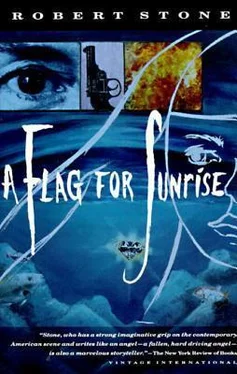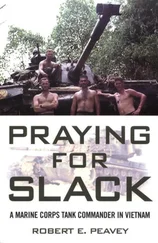Robert Stone - A Flag for Sunrise
Здесь есть возможность читать онлайн «Robert Stone - A Flag for Sunrise» весь текст электронной книги совершенно бесплатно (целиком полную версию без сокращений). В некоторых случаях можно слушать аудио, скачать через торрент в формате fb2 и присутствует краткое содержание. Год выпуска: 2012, Издательство: Vintage, Жанр: Современная проза, на английском языке. Описание произведения, (предисловие) а так же отзывы посетителей доступны на портале библиотеки ЛибКат.
- Название:A Flag for Sunrise
- Автор:
- Издательство:Vintage
- Жанр:
- Год:2012
- ISBN:нет данных
- Рейтинг книги:4 / 5. Голосов: 1
-
Избранное:Добавить в избранное
- Отзывы:
-
Ваша оценка:
- 80
- 1
- 2
- 3
- 4
- 5
A Flag for Sunrise: краткое содержание, описание и аннотация
Предлагаем к чтению аннотацию, описание, краткое содержание или предисловие (зависит от того, что написал сам автор книги «A Flag for Sunrise»). Если вы не нашли необходимую информацию о книге — напишите в комментариях, мы постараемся отыскать её.
A Flag for Sunrise — читать онлайн бесплатно полную книгу (весь текст) целиком
Ниже представлен текст книги, разбитый по страницам. Система сохранения места последней прочитанной страницы, позволяет с удобством читать онлайн бесплатно книгу «A Flag for Sunrise», без необходимости каждый раз заново искать на чём Вы остановились. Поставьте закладку, и сможете в любой момент перейти на страницу, на которой закончили чтение.
Интервал:
Закладка:
As Justin and Godoy walked toward the fair, beggars crept out of the shadow of the church wall to intercept them. In the darkness, they were tiny, barely human figures, small wads of cloth appended to upturned palms, uttering soft wails. Justin handed out some ten- and twenty-centavo pieces, Father Godoy gave them nothing.
One of the machines played “ La Cumparsita ” as the two of them strolled out on the little midway. The light there was fantastical, compounded of rainbow colors. Children’s faces were unearthly shades, the grass underfoot looked painted.
The men in the crowd were drunk and somber but there were mainly women and children about. A few groups of teen-agers huddled beyond the light like predators around a camp, some of them smoking marijuana. In the darkness by the river, a drunk or a madman was screaming but his cries were drowned by the music.
People greeted Father Godoy as he passed among them; stony Indian faces softened toward him, there was some quick whisking off and clutching of straw sombreros. Both he and Justin towered over the crowds.
“A fair was a great thing once,” Godoy said. “There were a great many tents and tricks. Today it’s not so much because the movies come here now.”
“It’s still a great thing,” Justin said.
Four of Godoy’s schoolboys were waiting in line by the larger carousel. Justin watched him apprehend them and point to his watch. The boys waved little red ticket stubs up at him. He shrugged and then stood looking about him over the heads of the crowd. Justin thought of having a beer but decided it would not be right for her to approach the stand and the drunken men there.
“I’m missing two,” Godoy said to her. “It’s a nuisance.”
“It’s fine,” Justin said. “I’ll wait by the merry-go-round.”
While Godoy combed the shadows, Justin found herself some space by the rail to watch the carousel. Around her were women whose children rode and women who stood with their children around them, watching the others.
He sees me as a fool, Justin thought fearfully. He sees my foolishness.
Under the lights, her face fixed on the whirl before her, she contemplated her inward place. It was a foolish place, of course, but orderly. Like a corridor in some worthwhile institution, the walls and floors all spotless, the suffering and the flesh behind white screens. A virgin’s place, a bit of a whited sepulcher.
It was dim and Lenten, its saints were shrouded and if it held any tabernacles they were open and empty. It was very far away.
The notion frightened her. Far, she thought — far from where?
It was fearful and a prison and so was the world. She looked at the crowd across the lights from where she stood; she and they were separated by miles.
But she had been in prison before and she had been afraid. Marched through the cicada din of a Mississippi night, to a place where the cotton fields were ringed with hooded watch lights and barbed wire under a million stars, to a blockhouse smelling of drains and urine. And then they turned out the lights in the block and the matron came out to tell ghost stories in the dark. It was the torment reserved for outside agitators that night, the treatment the guards had smirked about all the way to Parchman. No prods, no bucket across the skull, not that night — but darkness and ghost stories.
Somebody said boy, if Folkways Records was here. They were in a black block because the white girls would kill them. In the dorm outside their jammed segregation cell, the black girls laughed or moaned and cried; some of them were sisterly, some insane and armed with razors.
The matron’s dusty little voice demanded “Who Got Mah Golden Ahm?”
The jughead innocence had its own horror. And nuns were bad luck there.
Goddamn it, Justin said to herself, I’m not a fool. He must know that.
She had seen the guns and the dogs; she knew well enough the difference between real wounds and painted martyrdoms. She had courage — her parents had it and she had it from them. All her life she had worked and soldiered with the best; wherever work and soldiering were required she could pay her way. We are not afraid today, she thought. What am I getting myself into? She shivered.
Then she looked up and saw that Father Godoy had taken a place opposite her along the carousel rail and, with the lights behind her, she felt that she could look at him unembarrassed. The two older boys whom he had sought stood, looking annoyed and drunk, behind him. Godoy was watching the children on the carousel.
The machine was playing a march from an old operetta; the children, with their eyes full of lights, were reaching out to snatch the brass ring that was suspended by a strap from a stanchion beside where Godoy stood. They circled past his gaze, undersized, rickety, plenty of them dwarfed or scabrous, the sixty-five percent, the survivors of birth and infancy in Tecan — on their painted horses. He looked at them as no father she had ever seen looked at his own children. His gray eyes shone like theirs, with such fierce love that she trembled to see him.
She felt then that all the companionship, all the moral recognition she had ever required from the universe reposed in the eyes of this priest. Between them the children went round and round, children of the campesinos, rojos, jíbaros —the wretched, the pobrecitos. She could not take her eyes from his face as he watched them.
At 0401 Pablo Tabor signed himself off the circuit and put out the last cigarette of his watch. On his way through Search and Rescue to the Coke machine, he saw the sky through the Operations Room window, it was alight and clear, pale yellow.
“Ah me,” he said softly.
Breedlove, the Operations yeoman, was watching him.
“Ol’ Pablo must have smoked about a thousand cigarettes tonight,” Breedlove told his yeoman striker. “I been watchin’ him and he’s smokin’ the shit out over there.”
“Leave me alone, Breedlove,” Tabor said. “I already told you.”
“Air,” Breedlove said, winking at the striker. “Ay-er — that’s what you need, Tabor.”
“Give him air,” the striker said busily.
Pablo was listening to his change rattle in the machine, to the bottle zip down its tin track. He picked it up, icy in his hot hand, and opened it.
“You know, you’re just a couple of fucking noises in my head.”
The striker smiled.
“That’s all you are.”
“We’re all a deck of cards,” Breedlove said.
“Hey, good night, Tabor,” he called down the corridor when Tabor walked out. “Sleep well, hear?” He leaned over the Operations desk to see that Tabor was out of hearing and addressed himself to the striker.
“Don’t think he ain’t scoffin’ those pills again. Tell by the little tiny eyes.” He narrowed his own eyes to a squint. “Speed-freak sparky. When he moves — it’s jit jit jit.” He moved the flat of his hand in little jits.
“Jitters,” the striker said.
“Don’t think they won’t nail him,” Breedlove said complacently.
“With this old man? Shit sure they’ll nail him.”
Some morning, Tabor thought, walking into the locker room, I’ll kill that skinny prick. Except he wants me to so much, I won’t.
He changed out of the dungaree uniform in which he had stood his watch and into civilian clothes. That morning he had brought a silky Western shirt, twill pants, a leather-like jacket and seven-stitch fancy boots. In the pocket of the jacket was a large aspirin bottle of Dexedrine and when he had changed he set the aspirin bottle beside his Coke and sat down on the wooden bench with his head in his hands.
Lord, he said to himself, the shit I sit still for. Make you weep, Jesus. He stood up suddenly and hit the tin grill of his locker with his left elbow and followed through with the palm of his right hand.
Читать дальшеИнтервал:
Закладка:
Похожие книги на «A Flag for Sunrise»
Представляем Вашему вниманию похожие книги на «A Flag for Sunrise» списком для выбора. Мы отобрали схожую по названию и смыслу литературу в надежде предоставить читателям больше вариантов отыскать новые, интересные, ещё непрочитанные произведения.
Обсуждение, отзывы о книге «A Flag for Sunrise» и просто собственные мнения читателей. Оставьте ваши комментарии, напишите, что Вы думаете о произведении, его смысле или главных героях. Укажите что конкретно понравилось, а что нет, и почему Вы так считаете.












